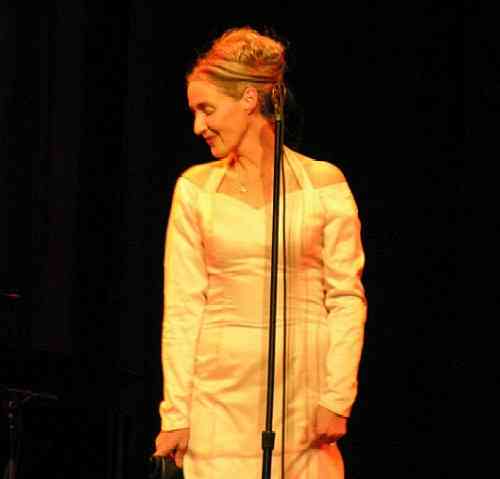
W hat the music I love expresses to me is not thought too indefinite to put into words but, on the contrary, too definite.”
— Felix Mendelssohn, letter to Marc-André Souchay, 15-OCT-1842.
W hen you make strange music like we do, there aren’t many people with whom you can talk about it. When [Lisa Gerrard] says, ‘Music is sacred,’ try to explain that to a ‘normal’ human being.”
— Klaus Schulze, Farscape.
Lisa Gerrard, born in Melbourne in 1961, is a musician, singer and composer who was a co-founder of the group ‘Dead Can Dance’ with former music partner Brendan Perry. Gerrard’s versatile vocal range (contralto to mezzo-soprano) and song-writing are what she’s best known for, but she also provides instrumentals on many of her recordings, most frequently playing yangqin (Chinese hammered dulcimer). Since the break-up of ‘Dead Can Dance’ she has been doing solo work plus selective collaboration—for most of the past ten years. Gerrard received a Golden Globe award and an Academy Award nomination for the score for the 2000 film ‘Gladiator’, her collaboration with Hans Zimmer. Her soundtrack for the 2003 film ‘Whalerider’ was also widely acclaimed.
The release (about 2 months ago) of her wonderful new CD ‘FarScape’—ethereal original space-music chamber compositions, accompanied by German keyboardist Klaus Schulze—led me to recently revisit her work.
 B
But, in fact, it was a series of emails yesterday in response to the previous two CMT blog posts about watery, atmospheric character pieces—
Debussy’s Arabesque No. 1 and
Saint-Saëns’s, Carnival of the Animals VII, ‘Aquarium’—that caused me to key up Gerrard’s cover of the larghetto aria in Handel’s opera ‘Serse’, from Gerrard’s 1995 CD ‘The Mirror Pool’.


No comments:
Post a Comment